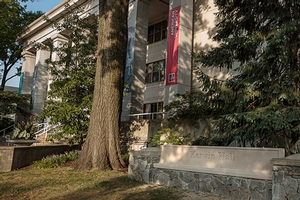On Campus
Improving Minority Graduation Rates in U.S. Colleges and Universities

American University's School of Public Affairs hosted a conference recently to discuss the challenges of improving minority graduation rates and invited colleges making strides to share best practices. Representatives from Barnard College, Washington University in St. Louis, Skidmore College, and AU were among the participants in the event.
"Hearing from others about the successful ideas they have employed to retain minority students provided great insight into how we can improve not only retention rates, but also the experience of our minority students in SPA and AU," said SPA Interim Dean Vicky Wilkins.
The gathering stemmed from research co-authored by Kenneth Meier, a distinguished professor at Texas A&M University and recent visiting scholar at SPA, and Amanda Rutherford, assistant professor of political science at Indiana University. The researchers analyzed federal student data from hundreds of colleges from 2010 to 2014 and ran models to predict graduation rates. Those campuses with higher-than-expected completion rates for underrepresented students were identified and asked to come to AU to discuss their strategies.
"Schools get to learn what each other are doing and find out what works," said Meier. "We spent a lot of time with the hard numbers. Now we want to know what makes the numbers go."
Many participants discussed the importance of programs for first generation, low-income and minority students to feel a sense of belonging on campus. Others explained initiatives to train faculty and staff on implicit bias and how to support students from diverse backgrounds.
Emelyn dela Pena, who oversees the Center for Diversity and Inclusion at Washington University, talked about the importance of campus officials responding to news of social injustice and creating space for students to discuss issues, such as police brutality in St. Louis or the plight of Puerto Ricans after the recent hurricane. Washington University requires all freshmen to participate in an hour-long identity literacy course every two weeks with others in their living community.
"First-year students are really hungry to have honest conversations," said Pena, adding the students are "college ready" but campuses need to be "student ready" with services to help them succeed.
Senior Associate Dean of Students of Skidmore, Luis Iona College says that as institutions transform to be more welcoming, faculty and staff need to extend genuine care to students.
"Students should feel they don't need to leave their narratives at home, but are embraced for who they are," said Iona. "We need to allow for students to be the expert in their own experiences and inform the practices."
Providing that personalized support, however, takes time and student service is not something always valued in the promotion and tenure process, noted Tracey Cameron, assistant dean in the Office of Intercultural Education at Wellesley College in Wellesley, Mass. She noted that change in higher education is slow, but the right leadership can help institutions be responsive to the diversifying student body.
Several AU administrators discussed strategies that have expanded the number of first-generation college students on campus (now 10 percent), Pell Grant recipients (20 percent) and underrepresented minorities (30 percent).
"Access is the easy part, retention is the hard part," said AU Provost Scott Bass.
Among the university's efforts to create a culture of inclusiveness and expand its support system: AU hired additional advisors for first-year students; piloted new courses in small settings to discuss race, identity, culture and the transition to college life.
"In every aspect of teaching, research, and campus community life, we must do a better job ensuring that we are both diverse and inclusive," said Wilkins.

